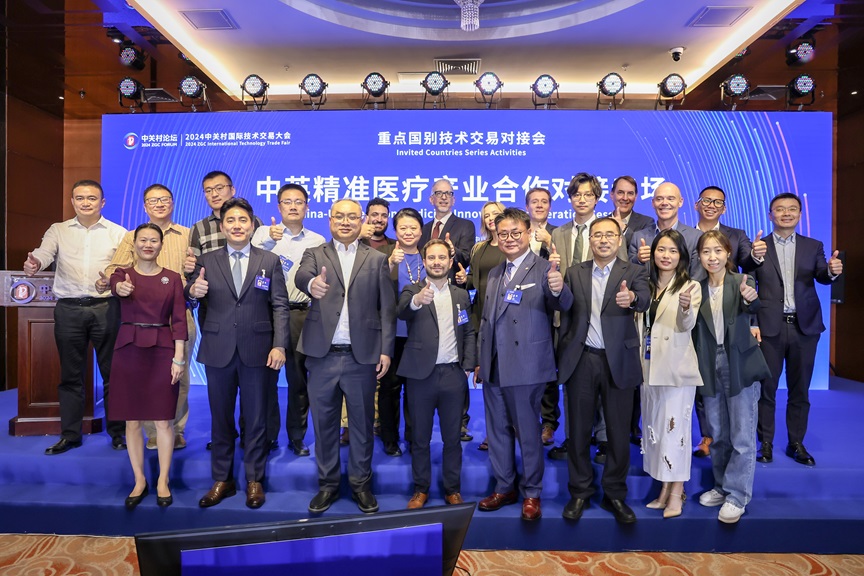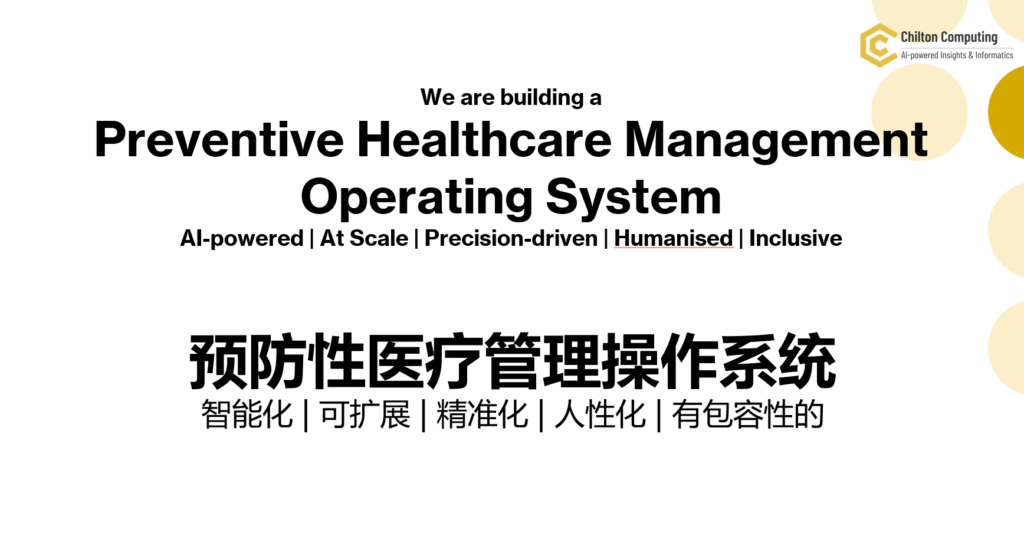Emerging Convergence in AI and HealthTech for Preventive Healthcare Management

Recently, I went to Beijing ZGC forum to present Chilton Computing’s latest activities in AI and HealthTech for ageing populations. This is a globally relevant topic, increasingly becoming a priority for the healthcare systems both in the UK and aboard.
Preventive Healthcare Management is a Global Challenge
A major portion of global healthcare spending is on preventable diseases, such as heart diseases, stroke, and falls, common for the elderly. According to a recent National Health Service (NHS) presentation in the UK, 40% of its budget is spent on preventable diseases.
According to the Centers for Disease Control and Prevention (CDC) in the US, the national public health agency, 75% of the US healthcare costs are devoted to treat chronic diseases and many of which are preventable.
We haven’t been able to find the equivalent number for China. But we do know that even in one of the best hospitals for heart surgery in China, 40% of the Coronary Artery Bypass Graft (CABG) surgeries are preventable.
Our Vision – AI and HealthTech for Preventable Disease Management

The trip was fruitful and thought-provoking. The organisation and support provided by P4 precision medicine accelerator and GlobalTechIP was great. I’ve talked to many businesses, startups, investors, and incubators during the trip.
I presented our vision for a next-generation Preventable Disease Management Operating System for ageing populations.
Links with 2000 Years of Chinese Medical Practice (中医)
Many technology challenges discussed in western healthcare literature resonate very well with the Chinese audience.
For the first time ever in my career, I was able to explain what is missing in the current technology provision from the Western HealthTech literature in Chinese, sometimes even using traditional Chinese idioms. The possibility to link the western healthcare terminologies with traditional Chinese medical practice has made the talk a lot more interesting and relevant.
For example, one of the major limitations in virtual consultations is the lack of presence and interactions between doctors and patients. These often mean touches and instant responses from physical examinations. As a result, online doctor apps can often only be used for minor illnesses.
The Chinese Way of Diagnosis
In China, the importance of physical interactions is a crucial part of traditional Chinese medical diagnosis method. It is is called 望闻问切 (pinyin – Mandarin Chinese phonics:wàng wén wèn qiè) which means four types of diagnosis. A traditional Chinese doctor practices these methods when he/she meets a patient face-to-face. The method includes four dimensions of examination:
望; 指观气色;See (or observe and watch) the spirit, posture, skin colour and tone, and facial expression
闻; 指听声息;Hear the voice, breathing sound, speech; and Smell the odour
问;指询问症状;Ask (or enquire) how the patient feels, experiences now and in the past
切;指摸脉象。Feel the pulse and Touch (and examine) the patient to gather a collective view of the overall status of the patient.
合称四诊 (collectively, it is called four-diagnosis method)
It is a very systematic way of examining a patient without using any instrument or equipment. It was invented more than 2,000 years ago in China. People said, it was by a very famous Chinese doctor named 扁鹊 (pinyin – Mandarin Chinese phonics: Bian Que – Wikipedia). He gained his fame during the Warring States period through practicing traditional Chinese medicine.
By using Chinese to communicate what we do, I have received overwhelming responses. There are clearly great synergies between the western healthcare system and the Chinese system. The general direction of travel is to adopt a more precision medicine driven approach. This is where personalisation, prediction, and prevention become the key drivers for healthcare delivery. Furthermore, there are also clear signs of common challenges and great recognition for collective common technology solutions.
Calling for Early Adopters and Advisors
Recognising these common challenges, Chilton is conducting a range of research and development to advance the state-of-the-art in digital healthcare. Our aim is to provide next-generation cross-cutting services to underpin preventive healthcare management. Our current main focus is on remote health and care monitoring, ensuring timely and adequate interventions through precision-driven personalised monitoring. This is expected to reduce the costs of delivering high quality care and enhance the capability of NHS to deliver more with less.
With the funding from InnovateUK, the UK’s innovation agency providing government funding for industry research, we are pushing forward our development at speed. We are developing our early adopter programme and stakeholder advisory group.
Please get in touch with Erica should you be interested in get involved!

